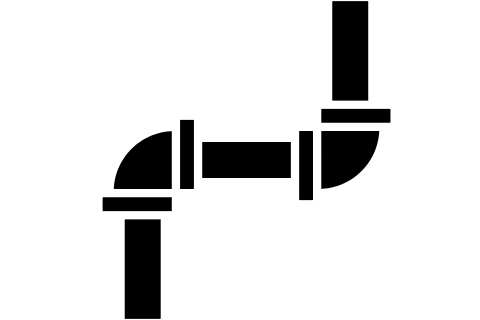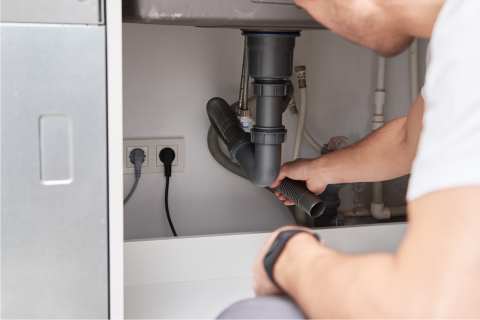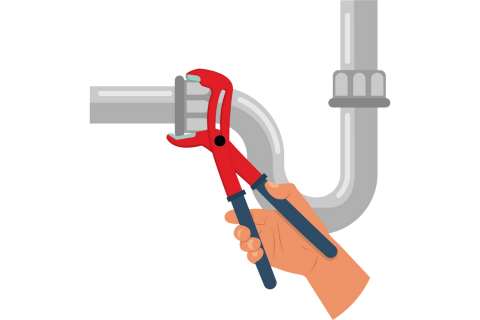What is a water hammer?
Water hammer, also known as hydraulic shock or pressure surge, is a common plumbing issue that many homeowners face.
Water hammer refers to a common plumbing problem where there’s a sudden change in water flow within pipes, resulting in a loud banging or knocking noise.
This happens due to the inertia of water when it’s forced to stop or change direction abruptly. Imagine water flowing swiftly through a pipe, and suddenly a valve shuts, causing the water to stop suddenly.
This abrupt stop creates a shock wave that travels back through the pipes, causing the noticeable banging pipes.
Water hammer occurs when the flow of water is interrupted suddenly, leading to pressure surges within the plumbing system.
Understanding how to fix water hammer is vital to prevent potential damage to your plumbing system.
What causes water hammer noise?
Water hammer noise can be caused by many different factors within a plumbing system. One common cause is the formation of shock waves, which occur when water flow is suddenly interrupted or redirected.

For example, when a faucet or valve is closed rapidly, it can create a surge of pressure that reverberates through the pipes, resulting in a characteristic banging sound.
Knowing how to stop water hammer can help prevent these disruptive noises and potential damage.
Sudden closure of valves
Another cause of water hammer is the sudden closure of valves within the plumbing system.
When valves shut too quickly, they can generate significant pressure spikes that travel through the pipes, leading to vibrations and noise.
New or Faulty Appliances

New or faulty appliances can be a common cause of water hammer. Washing machines and dishwashers are often the culprits, as their solenoid valves can close suddenly, creating a shockwave that travels through the pipes.
To fix this issue, you can try adjusting the valve to close more slowly or replacing it with a new one.
Additionally, installing a water hammer arrestor on the appliance’s water supply line can help absorb the shockwave and prevent water hammer.
Get a Boiler Service >Other causes of water hammer in a plumbing system
Entrapped air chambers

Entrapped air in the pipes is another culprit behind the water hammer. Air bubbles can become trapped in the plumbing system, especially in high points or bends in the pipes.
When water flow changes direction or speed, these air pockets can compress and expand, contributing to the noise and vibrations associated with water hammer.
Worn or faulty valves
Additionally, worn or faulty stop valves can exacerbate water hammer issues. Installing a pressure reducing valve can help manage water pressure and reduce the occurrence of water hammer caused by faulty valves.
Over time, valves may deteriorate or become ineffective at regulating water flow, leading to abrupt changes in pressure and increased likelihood of water hammer occurrences.
In summary, water hammer noise is typically caused by the formation of a pressure wave, sudden valve closures, entrapped air in the pipes, and worn stop valves within the plumbing system.
Addressing these underlying causes is essential for mitigating water hammer and preventing potential damage to the plumbing infrastructure.
Effects of Water Hammer
Water hammer can have several effects on your plumbing system, including:
Damage to Plumbing Systems
Water hammer can cause significant damage to your plumbing system, including:
- Cracked or broken pipes
- Loose connections and fittings
- Damaged valves and appliances
- Increased risk of leaks and water damage
Noise and Vibration
Water hammer can also cause noise and vibration, which can be annoying and disrupt daily life. The loud banging noise can be heard throughout the house, and the vibration can cause dishes and glasses to rattle.
Increased Water Pressure
Water hammer can also increase water pressure in your plumbing system, which can lead to further damage and problems. High water pressure can cause pipes to burst, fittings to fail, and appliances to malfunction.
Can water hammer damage pipes?
water hammer can indeed damage pipes if left unchecked. The repeated occurrence of water hammer can subject pipes to significant stress and strain, potentially leading to many forms of damage over time.
The force generated by water hammer can weaken the structural integrity of pipes, making them more susceptible to cracks, leaks, or even bursts.
Additionally, the vibrations and pressure surges associated with water hammer can loosen pipe fittings and connections, further increasing the risk of leaks and damage.
Furthermore, water pressure can accelerate the wear and tear on pipes, valves, and other components of the plumbing system. This can result in deterioration and the need for costly repairs or replacements.
While water hammer may seem like a slight problem due to the noise it produces, it has the potential to cause significant damage to pipe straps and plumbing infrastructure if not addressed quickly and effectively.
Therefore, it’s necessary to take preventive measures and address water hammer issues to protect the integrity and longevity of the plumbing system.
Regular servicing will help identify any problems before they get worse, like if you had a pinhole leak in radiator.
Get a Boiler Service >How do I get rid of the air in my water pipes?
To eliminate air from your water pipes and alleviate the potential for a water hammer, you can follow a simple process known as bleeding or purging the air from the plumbing system. Here’s how you can do it
- Identify High Points – Work out the highest points in your plumbing system where air tends to accumulate. These are typically near fixtures on upper floors or at the highest points of your piping.
- Open Faucets – Start by opening the faucets at these high points. This allows air trapped in the pipes to escape as water flows out. You may notice sputtering or spurts of air followed by water.
- Work from Top to Bottom – Begin bleeding the air from the highest fixtures and work your way down to the lowest points in the system. This helps ensure that air trapped in the higher pipes is expelled first before moving to lower sections.
- Flush Toilets – Flush toilets in your home to help push air out of the plumbing lines connected to them. Flushing can also help clear any air bubbles trapped in toilet supply lines.
- Close Faucets – Once you’ve purged the air from the system, close the faucets starting from the lowest points and working your way up to the highest.
- Check for Air – After closing the faucets, check for any remaining air pockets by running water from each faucet throughout your home. If you notice sputtering or uneven flow velocity, there may still be air trapped in the pipes.
- Repeat if Necessary – In some cases, it may be necessary to repeat the bleeding process to fully remove all air from the plumbing system, especially if air continues to be trapped.
By bleeding the air from your water supply pipes and regular boiler servicing, you can help ensure smooth water flow and reduce the risk of water hammer caused by air pockets.
How to Fix and Prevent Water Hammer
Install Water Hammer Arrestors
To effectively install a water hammer arrestor, place it at key locations in your plumbing system, such as near appliances or fixtures.
By installing water hammer arrestors at key locations in your plumbing system, such as near appliances or fixtures, you can effectively stop the radiators making noise that comes with water hammer.
Install an Air Chamber
An air chamber is a vertical pipe installed near fixtures or appliances that experience water hammer.
The air chamber acts as a cushion, absorbing pressure fluctuations and preventing shock waves from reverberating through the plumbing system.
Make sure the air chamber is properly sized and installed to be effective.
Regulate Water Pressure
High water pressure can exacerbate water hammer issues by increasing the force of pressure surges within the plumbing system.
Install a pressure relief valve (PRV) at the main water supply line to regulate water pressure and prevent pressure spikes that can lead to water hammer.
Secure Loose Pipes
Loose pipes are more prone to movement and vibration, which can amplify the effects of water hammer.
Secure loose pipes with pipe clamps or straps to prevent them from rattling or banging against nearby surfaces during water flow.
Bleed Air from Pipes
As mentioned earlier, air trapped in the plumbing system can contribute to water hammer. Bleed air from the pipes by opening faucets at high points in the system and allowing the air to escape.
Repeat this process periodically to make sure that air pockets are minimised.
Upgrade to Fast-Acting Valves
Replace slow-closing valves with fast-acting valves to reduce the duration and intensity of pressure surges caused by sudden valve closures.
Fast-acting valves help decrease the impact of water hammer by allowing water flow to stop more gradually.
Check for Clogged Air Chambers
Inspect air chambers for any obstructions or build up that may impede their ability to absorb pressure fluctuations. Clean or clear any debris from the air chambers to gain optimal performance.
Consider Water Hammer Arrestor Installation
If water hammer persists despite other preventive measures, consider installing water hammer arrestors directly at fixtures or appliances experiencing the issue.
These specialised devices absorb pressure surges and prevent them from traveling through the plumbing system.
How much does a plumber cost?
If you were to get a specialised plumber out to have a look at the problem, you might be asking yourself, how much does a plumber cost?
Depending on the problem, such as your pipes knocking, causing the water hammer, and where you live, a plumber will cost between £100 to £300 to fix your water hammer issues, depending on the severity.
Understanding how to fix water hammer can help you decide whether to hire a professional or attempt a DIY solution.
FAQ’S
Do I need a water hammer arrestor for a shower?
Whether you need a water hammer arrestor for a shower depends on certain factors, including the design of your plumbing system and the presence of water hammer issues.
They are typically installed at fixtures or appliances that are prone to experiencing sudden changes in water flow, which can lead to pressure surges and the associated loud banging noise.
In many cases, showers can benefit from the installation of water hammer arrestors, especially if you notice signs of water hammer such as loud banging or knocking noises when you turn the shower on or off.
Additionally, if your home has high water pressure or if the plumbing system is prone to pressure fluctuations, installing a water hammer arrestor for the shower can help alleviate the issue.
They act as shock absorbers, absorbing the pressure spikes caused by sudden changes in water flow and preventing them from reverberating through the plumbing system.
This helps reduce noise and vibration, increases the lifespan of plumbing fixtures, and lowers the risk of damage to pipes and fittings.
If you’re experiencing water system issues with your shower or if you want to prevent potential problems, consider consulting a plumber to assess your plumbing system and determine whether installing a water hammer arrestor for the shower is necessary.
Can water hammer cause pipes to burst?
Yes, water hammer can potentially cause other pipes to burst if the pressure surges and shock waves associated with water hammer are severe enough and occur repeatedly over time.
While the water hammer itself may not directly cause pipes to burst in most cases, the increased stress and strain placed on the pipes can weaken their structural integrity, making them more susceptible to failure.
The force generated by the water hammer can exert significant pressure on the walls of the pipes, especially at weak points such as joints, bends, or areas of corrosion.
Over time, this repeated stress can lead to the development of cracks or fractures in the pipe walls, eventually resulting in a pipe burst.
By using measures to mitigate water hammer, such as installing water hammer arrestors, water pressure regulator, and securing loose pipes, you can help protect your plumbing system from the risk of pipe bursts and other costly damages.
Regular servicing and inspections can also help identify and address any problems in the plumbing system before they escalate.
Get a Boiler Service >